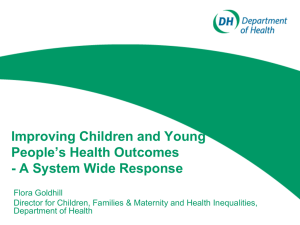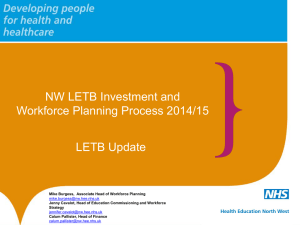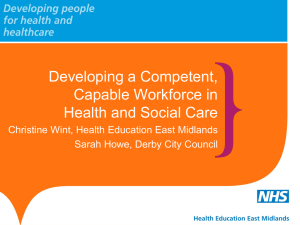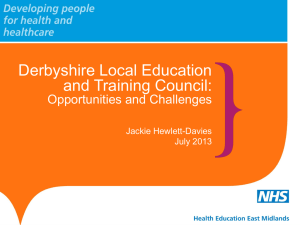CoD Follow up response to NHS future forum on education and
advertisement
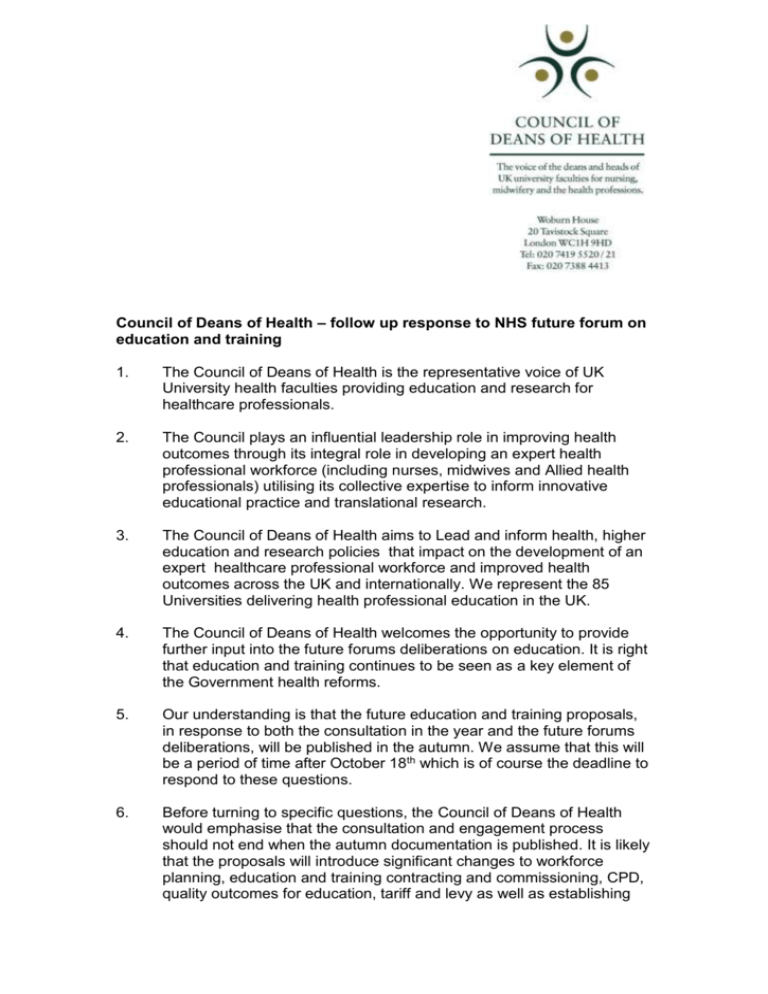
Council of Deans of Health – follow up response to NHS future forum on education and training 1. The Council of Deans of Health is the representative voice of UK University health faculties providing education and research for healthcare professionals. 2. The Council plays an influential leadership role in improving health outcomes through its integral role in developing an expert health professional workforce (including nurses, midwives and Allied health professionals) utilising its collective expertise to inform innovative educational practice and translational research. 3. The Council of Deans of Health aims to Lead and inform health, higher education and research policies that impact on the development of an expert healthcare professional workforce and improved health outcomes across the UK and internationally. We represent the 85 Universities delivering health professional education in the UK. 4. The Council of Deans of Health welcomes the opportunity to provide further input into the future forums deliberations on education. It is right that education and training continues to be seen as a key element of the Government health reforms. 5. Our understanding is that the future education and training proposals, in response to both the consultation in the year and the future forums deliberations, will be published in the autumn. We assume that this will be a period of time after October 18th which is of course the deadline to respond to these questions. 6. Before turning to specific questions, the Council of Deans of Health would emphasise that the consultation and engagement process should not end when the autumn documentation is published. It is likely that the proposals will introduce significant changes to workforce planning, education and training contracting and commissioning, CPD, quality outcomes for education, tariff and levy as well as establishing new local education and training boards and HEE. This system will take time to bed down and will not become fully operational for another 18 months. Therefore it will be vital that HEIs, as key co-producers of the NHS workforce as significant employers of health and social care professionals and as generators of vital translational research are able to have a central role in developing and commenting on future proposals beyond the autumn and throughout the transition stages. 7. We would also want to take this opportunity to note the recent press coverage (particularly in The Times) in relation to nursing education and concerns about nurses receiving too much academic content and not enough practical experience during their pre registration courses. We would emphasise that universities ensure that students entering the profession have the appropriate blend of personal attributes such as caring along with the necessary knowledge and skills to deliver high quality evidenced-based nursing care for patients. In considering nursing education and training more broadly, we would advocate the need to consider the post qualification pathways for recently registered nurses and the importance of continued professional development. Education and training must not stop at the point of registration and to ensure that we develop a well educated and compassionate workforce it will be vital that the new system of education and training can encourage 7. The forum has asked the overarching question ‘how can we make sure that we have the right incentives and accountabilities for developing the healthcare workforce to enable the delivery of world class, patientcentred healthcare’ and sets out a number of sub questions. We have therefore tried to address this central question within our responses to these questions. 8. We have also set out the 6 key principles that we consider are vital for the new system of education and training in England. We hope that the education and training forum will be able to reflect on these key principles with their deliberations. These principle are elaborated upon within our responses to the individual questions but are set out below; Council of Deans of Health – Key principles for new education and training system Agreement on a statement of effective partnership between the NHS and Universities, advocating the role of university led health professional education in improving patient outcomes through coproduction of the workforce. This would be renewed every five years, agreed at national level and would form an integral part of the monitoring arrangements between HEE and LETBs. (drawing on HENSE partnership document) Workforce planning at a local and national level must be truly multiprofessional and avoid professional silos, both in relation to funding and the structures and governance arrangements that underpin workforce planning. Sustainable education commissioning informed by evidence-based, medium to long term workforce planning and which includes funding and administration for clinical academic and research pathways at a national level. Representation of both non medical and medical education on the board of LETBs to ensure effective co-production of the healthcare workforce. To avoid conflicts of interests (which will apply to teaching hospitals as well as Universities), commissioning sub committees should be set up to deal with commissioning issues within LETBs. The development of non-medical post-registration career pathways, to facilitate a continuous culture of learning and development and to support the delivery of new pathways of care. Ring-fenced funding of the overall health education and training budget and a continuation of a nationally negotiated benchmark price for health professional education. 9. If you wish to discuss this paper further please contact Matthew Hamilton on 0207 210 5421 Council of Deans of Health 28th October 2011 Council of Deans of Health – response to individual questions from Education and Training Forum How can we ensure that education and training in the new system is flexible and fit-for-purpose for the new way that care is delivered and enables training beyond the job, for example stimulating a culture of continuing professional development or academic and research development? One of the fundamental challenges for the new education and training system will be whether it can truly ensure the co-production of a workforce which can deliver ‘the new way that care is delivered’. The nature of care is changing, with an increased focus on care being delivered in community settings and in ensuring prevention and improved patients outcomes. With increasing numbers of individuals managing long term conditions and more patients rightly wanting to take an increased role in their own care, it will be vital that the future workforce can mirror the increasing focus on public health. The Council of Deans of Health would emphasise the importance of the new education and training system being multi-professional, both in the systems that are set up and in the structures and governance arrangements that will underpin the system. If decisions on workforce planning and education are made in professional silos, then it will not be possible for the education and training system to be flexible and fit for purpose. In relation to stimulating a culture of continuing professional development, the Council of Deans of Health believes that there should be clear definition of what is meant by continuing professional development (CPD) as well as post qualification education. If MPET is to continue to fund junior doctors salaries and postgraduate placements/training then this should also extend to non medical education in areas such as postgraduate training and preceptorships Funding arrangements for CPD and postgraduate education will therefore be crucial in stimulating a culture of CPD. Consideration must be given as to the funding of postgraduate programmes for non medical programmes being part of a central bundle of funding, which is administered centrally. Additionally there are many aspects of traditional CPD funding which we consider must be captured centrally within the MPET. These include post registration career pathways for non medical education which are crucial in developing the educators of tomorrow. There must be funding for non-medical post-registration career pathways and HEIs need to be involved in the structuring of these pathways. For example, Diagnostic radiographers currently work in a variety of screening programmes, such as breast, foetal anomaly/Downs and aortic aneurysm screening, where radiographers and sonographers play major parts; and bowel and physical examination of newborns, where they have roles in secondary screening procedures. The diagnostic radiographers involved in these screening programmes work across screening and symptomatic services. The funding for post-registration career pathways that allow diagnostic radiographers to take part in such programmes is currently provided by SHAs. We are very concerned that the funding for such programmes would be lost in transition. It is essential that the funding for non-medical post-registration pathways such as these is reflected in new multi-professional funding arrangements just as the funding for the medical careers is equally protected and distinct from CPD funding. More widely we believe that professional development for healthcare professionals, which is a core part of ensuring safe high quality care with improved patients outcomes, must be funded through MPET to ensure that the continued professional development of the professions is not lost. A specific example of what needs to be captured via MPET is independent prescribing for nurses. We would consider that nationally it is strategically important for the numbers of nurse prescribers to increase and therefore it is appropriate that such training is funded at a national level rather than relying on pockets of funding for certain areas of the country. There are many other examples and we therefore feel that the definition of MPET should be broad enough to capture centrally funded CPD, where there is a strategic national need to. In addition to ensure equity, preceptorships should also be funded nationally for non medical education graduates to ensure principles of equity and multiprofessionalism can be upheld if postgraduate medicine remains part of MPET. We welcome the commitment that there must be a duty on the SofS to promote a comprehensive education and training system. We would additionally recommend that this duty should make reference to the SofS having a duty to promote CPD and postgraduate education and that this duty should also extend to NHS Foundation Trusts and Health and well being boards. How can we ensure the right balance of responsibilities and accountability and line of sight throughout the new system (for example, Health Education England and the provider-led networks, employers / professions / education sector, whole workforce) including for research training? The proposed relationship between HEE and local skills networks is at present unclear. There could be a tension between the short-to-medium term priorities that LSNs would see as their responsibility and the medium-to-longer term perspective that HEE should take. If HEE is to have a medium-to-long term view of workforce planning (which we fully support) then there must be greater clarification over the powers that HEE will have over local skills networks. For example, if the 4,200 health visitor target was not being delivered through the local skill network commissioning plans, what powers would HEE have to ensure that this was delivered? The Council of Deans of Health would advocate a power of direction for HEE over local skills networks to ensure that wider workforce needs can be met. HEE will need to exercise strong and consistent governance. There will also be a need for HEE to review the performance of local skills networks and that this should include considering the effectiveness of partnership arrangements. HEE must also be equipped to take forward issues at a national level which are appropriate for them to do so (such as national funding/commissioning of smaller professions and clinical academic pathways). How do we best ensure an effective partnership with health, education and research at a local level? A true partnership must be manifest in all elements of the new system, from the operation and constitution of Health Education England (HEE) to the mechanics of contracts and commissioning. Equally this should extend to the commissioning of NHS services through consortia and the NHS Commissioning Board. We would also advocate that HEIs should be an integral part of LETBs rather than just being held to account by them. HEIs are not simply providers of education programmes but also co-producers of the workforce through their wider role in research, innovation, releasing social capital, and the globalisation of health care which is integral to the development of advanced clinical care, service redesign and workforce planning. HEIs should work in co-production with the NHS to ensure the delivery of high quality education and training and then be held to account by HEE. By ensuring HEIs are part of the LETB, this will facilitate effective partnerships and improved quality outcomes. Universities must therefore continue to play an integral and leading part in the new system, working in co-production with NHS providers to co-design, deliver and develop an expert workforce that can meet the future care challenges and deliver high quality care for patients. The education and training proposals offer a real opportunity to establish effective and wide ranging partnerships between health, social care, education and research at a local level. Instead of maintaining the old fashioned provider/commissioner split between the NHS and Universities there is a real opportunity to ensure the development of more effective partnerships through co-production of the workforce. We would therefore advocate the following specific proposals in order to ensure effective partnership; a) Agreement on a statement of effective partnership principles between the NHS and Universities, renewed every five years which would be agreed at a national level and would form part of the monitoring arrangements between HEE and LETBS and . This would draw on the HENSE collaboration document agreed in 2010. b) Representation of both non medical and medical education on the board of LETBs. To avoid conflicts of interests (which will apply to teaching hospitals as well as Universities), commissioning sub committees should be set up to deal with commissioning issues. c) local education and training boards could be renamed local education, research and training boards to emphasise the importance of research in new partnerships How can we ensure appropriate and effective patient and public engagement in the new system? The Council of Deans of Health would welcome patient and public engagement within the education and training system. This is particularly important in giving a voice to the local population to hold local education and training board (LETB) to account in ensuring that the local population has the right numbers of NHS health professional staff to support healthcare within the locality of the LETB. They should also be held to account to ensure effective continued professional development and postgraduate education as appropriate. To ensure effective patient and public engagement at a local level we would recommend that there is a patient representative on the board of HEE, who will be responsible for overseeing the suitability and performance of LETBs. How can we improve information on the quality of education and training and what should be the roles and accountabilities of the key players in this? Information of the quality of education and training should focus on outcomes and be able to measure the competence of staff of all professional backgrounds. The Council of Deans of Health would strongly advocate one clear and consistent framework for information on quality of education and training which is used by all LETBs to ensure meaningful comparison and to avoid unnecessary duplication. We therefore support the development of an education outcomes framework providing this can utilise existing information where-ever possible. We have set our response to the informal consultation on draft Education and Training Outcomes framework in more detail in Annex A. ANNEX A Council of Deans of Health (CODH) response to the informal consultation on the Draft Education Outcomes Framework 1. The Council of Deans of Health is the representative voice of the UK university health faculties providing education and research for healthcare professionals. The Council plays an influential leadership role in improving health outcomes through its integral role in developing an expert health professional workforce and utilises its collective expertise to inform innovative educational practice and translational research. 2. We welcome the opportunity to comment on the draft outcomes framework at this early stage. We will continue to feed into the framework via the reference group and we would encourage those leading on this important work-stream to continue the regular consultation and feedback during the transition period to the new system. 3. The Council of Deans of Health welcomes, in principle, the concept of an Education Outcomes Framework. We agree that the ongoing education and training of the whole workforce is a crucial element of improving patient outcomes. By focusing on outcomes the framework will help to embed the notion of the importance of education and training in improving the quality of care. Going forward it be will be important to clarify exactly how outcomes will be measured within the new system and how the framework will capture all those responsible for education and training. 4. There is much to welcome within the draft. We particularly welcome the fact that the draft domains refer to the importance of ‘promoting professional development and research’, ‘effective team and interdisciplinary working’ and respond to changing service domains’ and excellence of student learning experience. All of these are fundamental in developing a multi-professional education and training system which also recognises the importance and benefit of research and innovation. Equally we welcome the alignment of the high level education outcomes with the patient outcomes for public health NHS and social care. This .reflects the need for education and training to prepare a flexible workforce which can promotes health outcomes and ensures high quality person /patient focused care across the interfaces of health and social care. This is particularly case for those professions that the CODH represents, which are increasingly employed and deliver interventions in diverse agencies across health and social care 5. In relation to our response to this informal consultation, we have set out a number of high level principles in relation to the draft framework and reflected how the framework may best reflect these. These are followed by some specific commentary on the slides and accompanying documentation. 6. Responsibilities of both HEIs and the NHS in education provision In order for the new education and training system to be effective it will be crucial that the future and existing workforce is able to continuously improve. HEIs have a vital role in this, which is reflected in the education and outcomes framework. However currently we feel that the framework is drafted in a way that only considers education and training in relation to the preparation of individuals to provide high quality care. The framework could therefore better reflect whether those individuals are part of an NHS organisation which fosters a learning environment in which the continuous development and improvement of both individuals and high performing teams is valued and in which clear post-qualification career pathways are identified for all professions. Separately, we would stress the importance of there being a clear articulation of how clinical academic pathways will be taken forward within the new system as this will be a key issue in delivering the overarching ambition of the education outcomes framework without which this will be difficult to achieve. Equally in relation to both Continuing Professional Development and practice placements a great deal of education and training is carried out within NHS settings. Currently Slide 6 suggests that LETBs will hold just education providers to account. We would emphasise the importance of this extending to service providers and that this should factor in the culture of education and training within a specific NHS organisation. The draft framework refers to one potential indicator, being board level engagement in education and training, which is to be welcomed but we would recommend that this is extended to cultural issues such as shared ownership and partnership working with HEIs as well as process issues. 7. Putting University and NHS partnerships at the heart of the education and outcomes framework The consultation document on education and training, as well as the future forum response, emphasises the importance of effective partnership and engagement between the NHS and HEIs in ensuring education quality. We would agree. Currently the draft domains that HEE would use to hold LETBs to account do not refer to evidence of effective partnership working between the NHS and HEIs. This will be crucial if the new system is to be successful. The CODH would advocate that there should be a specific domain for these partnerships, utilising an updated version of the HENSE protocol as a way of measuring performance within this area and that this partnership is inherent at all levels of the new education and training system. We would also advocate that HEIs should be part of the LETBs rather than just being held to account by them. HEIs are not simply providers of education programmes but also co-producers of the workforce through their wider role in research, innovation, releasing social capital, and the globalisation of health care which is integral to the development of advanced clinical care, service redesign and workforce planning. HEIs should work in co-production with the NHS to ensure the delivery of high quality education and training and then be held to account by HEE. By ensuring HEIs are part of the LETB will facilitate effective partnerships and improved quality outcomes. HEE will also be held to account in relation to the outcomes by the Secretary of State. A vital outcome will be to ensure the sustainability of the University sector both in relation to teaching and research which should be reflected within the outcomes. 8. Avoiding duplication and ensuring value for money Whilst the framework has a logical structure and is clearly linked to clinical outcomes, it will be vital that we use this opportunity to end duplication of reporting once and for all. Universities delivering health professional education currently undergo internal QAA, annual performance monitoring by regulators and approval events through the regulators for all regulated courses. The education and training consultation emphasised the importance of ensuring value for money within the system and this needs to be reflected in the monitoring arrangements with an emphasis on streamlining existing QA requirement and avoiding duplication. The new education outcomes framework should not just be overlaid onto the existing system of reporting. It will be important that there is a systematic review of standards, monitoring and indicators to ensure that there is no duplication and that each element for which an HEI is held to account is at the appropriate level. For example, it will be important to clarify how the professional regulator’s role in monitoring standards and the domain measurement to ‘meet standards set by independent regulatory/statutory bodies’ would work in practice. Equally as the NHS will be key partners in education in relation to the delivery of practice based education, it will also be important to reflect on the QAA requirements of the framework for the NHS and how they interact with other NHS QA and regulatory requirements in relation to CQC, Monitor etc. More broadly we would welcome clarification that the education outcomes framework should be the way in which HEIs are held to account. There is a danger, with the introduction of more LETBs, that HEIs may be held to account in different ways leading to a further information burden. If HEE is to be able to hold LETBS to account then there does need to be consistency of approach within the framework and all partners involved in healthcare education need to be clear about the respective QA frameworks and the interactions between them. 9. Fostering a multi-professional approach to education and training A key success criterion for the outcomes framework will be the extent to which it encourages a multi-professional approach to education and training. We therefore welcome the focus on the domains to promote interdisciplinary working and the need to respond to changing service needs. The outcomes measurement refers to ‘individuals and professional groups aligned to workforce demand’. This is somewhat unclear and it would be helpful, in line with the importance set out in previous document to ensure a multi-professional approach, if there was a direct reference to promoting a multi-professional approach. 10. Specific text proposals We would make the following specific text proposals Aim The aim should refer to a patient centred multi-professional workforce Outcomes The outcomes refer to competent and capable staff, but the aim only refers to capable. There should be consistency and references to both in the competent and capable. The outcomes individual and professional group aligned to workforce demand should be clarified in relation to multiprofessional groups aligned to workforce demand There should be an additional outcome in relation to HEE being held to account for the sustainability of the health professional education sector. Domains Effective partnership working between the NHS and HEIs should be an additional domain The second outcome should be revised to say promote professional development, professional and clinical academic career pathways, research and innovation The domain ‘promote effective team and interdisciplinary working should be revised to say ‘ multi-professional working’ to ensure a whole workforce approach
